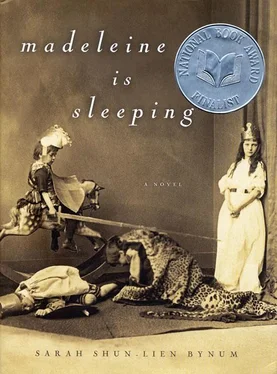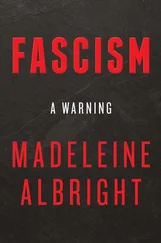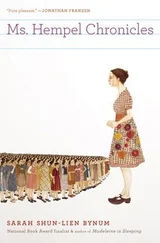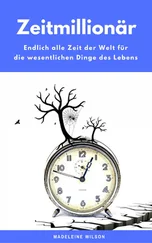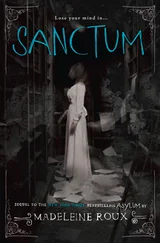Sarah Bynum - Madeleine Is Sleeping
Здесь есть возможность читать онлайн «Sarah Bynum - Madeleine Is Sleeping» весь текст электронной книги совершенно бесплатно (целиком полную версию без сокращений). В некоторых случаях можно слушать аудио, скачать через торрент в формате fb2 и присутствует краткое содержание. Год выпуска: 2008, Издательство: Harcourt, Inc, Жанр: Современная проза, на английском языке. Описание произведения, (предисловие) а так же отзывы посетителей доступны на портале библиотеки ЛибКат.
- Название:Madeleine Is Sleeping
- Автор:
- Издательство:Harcourt, Inc
- Жанр:
- Год:2008
- ISBN:нет данных
- Рейтинг книги:5 / 5. Голосов: 1
-
Избранное:Добавить в избранное
- Отзывы:
-
Ваша оценка:
- 100
- 1
- 2
- 3
- 4
- 5
Madeleine Is Sleeping: краткое содержание, описание и аннотация
Предлагаем к чтению аннотацию, описание, краткое содержание или предисловие (зависит от того, что написал сам автор книги «Madeleine Is Sleeping»). Если вы не нашли необходимую информацию о книге — напишите в комментариях, мы постараемся отыскать её.
Madeleine Is Sleeping — читать онлайн бесплатно полную книгу (весь текст) целиком
Ниже представлен текст книги, разбитый по страницам. Система сохранения места последней прочитанной страницы, позволяет с удобством читать онлайн бесплатно книгу «Madeleine Is Sleeping», без необходимости каждый раз заново искать на чём Вы остановились. Поставьте закладку, и сможете в любой момент перейти на страницу, на которой закончили чтение.
Интервал:
Закладка:
gift
what happened to your hands? The question gathers at the back of the barn and sweeps forward in a bitter gust of curiosity. Murmuring, and clucking, and craning their necks, the audience asks what the idiot does not have the strength of mind to say. I am not tonight’s attraction! the gjurl protests, though looking down at her hands, she sees that her two great mitts have at last completed their return. What happened? surges up once more from the audience. She is suddenly glad that the half-wit is there to keep her from falling. Not wanting to look again at her hands, she turns boldly to the audience: It’s nothing! she cries. And peering out at them, she discerns their faces: jealous Sophie, who now wears her hair piled atop her head; the bald-pated chemist, who used to slip her sweets behind his counter, the bashful mayor, his youngest daughter perched neady on his lap; and Mother, Father, her brothers and sisters, among them the foolhardy Mimi, whom Mother is barely restraining from running forward to the stage. Mysteriously, these faces she remembers as so particular are now almost indistinguishable to her, every one of them stricken, every one of them wearing an identical look: of guilt, and most especially of pity. She cannot bear to be the object of this look. But they have made me special! she insists. They have taken me to places I would never otherwise have been. And displaying her mangled hands for all to see, she repeats a phrase borrowed from M. Pujol: An abnormality, to be sure but consider it, as should you, a gift! The audience remains unconvinced.
act
look, she says, I can tuck my feet behind my ears, and waddle about on my hands. But when she demonstrates, the spectators simply shake their heads and sigh. Listen, she says, disentangling herself, 1 can make a sound louder than a thunderclap! But when she slams her mitts together, only the idiot jumps in surprise; the barn fills with the rustle of people shifting in their seats. This I know you will like, she tries again. I can start the bullfrogs singing. And blowing into the horn of her hands, she makes a deep, sad, bellowing sound, the lowest note in M. Pujol’s scale, and soon enough, rising up in all directions, comes the distant chorus of frogs, jowls swelling with song, their voices carrying from all the wet corners of the world: the riverbank, the millpond, the water hole behind the barn, the empty pool where a widow once kept her fish. The audience finds this stirring performance merely cause for greater pity. Madeleine hears the sound of sniffling, and is enraged. Among the rich, she shouts, my gifts are in great demand!
encore
the half-wit has already unbuttoned his breeches. So it is with little difficulty that she arranges him: he must arch his back; he must let his head drop between his arms; he must appear more dog-like. In exasperation, Madeleine presses her hand into the small of M. Jouy’s back: Like so! There once was a widow, she shouts at the barn, who so favored my talents, she would say of them only, Louder! And, smack! is the sound of a girl’s hand falling squarely upon the backside of an idiot. Smack! is the sound of her palm meeting the flesh of his bared cheeks. She lived in a very grand house, Madeleine cries. She had Persian carpets in every room. But nothing gave her greater pleasure than the sight of my two hands! And once again she displays them proudly, as if they are a hundred times more rare than anything this barn has ever seen. In truth, Madeleine is sorry to have them back in her possession. She is sorry never to have stroked the hair on M. Pujol’s neck, and she would have liked to touch the pulsing hearts of her neighbors; in truth, the short life of her ten perfect fingers is causing her own heart to wither, and it is all she can do to keep from weeping, stupidly as the half-wit — but she would rather die than show regret, so she brings her paddle down more swiftly on the idiot. There once was a man, she declares, who had suffered so much, he found relief, he found solace, in the touch of these hands. But the person whom she is paddling now does not shiver and moan as M. Pujol once did. Instead he is making a snuffling noise; he is choking, it seems, on the spill of his tears. If only you knew Le Petomane, she tells the audience. If only he were here.
inevitable
in uttering these words, she sees him at last, M. Pujol. He is not nearing the barn, nor mounting the stage she has built for him. Nor is he naming the parts of his body, as he trembles beneath the photographer’s brave hands. M. Pujol is sleeping: a patient etherized upon a table. The director is quaking slightly in his excitement. He presses the tip of his scalpel against the pale skin, then retreats; he presses again, and draws back his hand. Too quickly, it will all be over; and he would like the anticipation to last forever. As for Adrien, the photographer, he is miles away from the hospital at Maryville. His little wagon of photographic equipment still rattles in his wake. He has traveled for many days, he has wandered into a market, and, stumbling over a mangy dog, he has found a stall selling figs — and though he tests the fruit between his fingers, he refuses to think of what he has forgotten to bring with him. Now he is standing in the center of Paris, on the boulevard des Capucines, ringing at the door of his brother. He presses against the bell and listens; he pushes it several times in quick succession, and strains to hear the sound of footsteps on the stair; he leans upon it with his entire weight, but cannot detect any movement, any sign of life, inside. Madeleine, she is beating on an idiot: a decent, speechless, lumbering man who had once tucked pennies in her pockets. She lifts her hand, and lets it fall; she repeats the gesture helplessly, again and again.
exit
SEEING AT LAST THE THREE OF THEM — girl, photographer, flatulent man — caught forever thus, and thus forsaken, she thinks, What terrible things we do, in our efforts to be admired. And it is with unthinkable strain that she resists the weight of her paddle, the pull of the earth, the stunned gaze of the audience and, most heavy, her wounded pride; it is with every inch of her being that she keeps her hand from falling upon the backside of M. Jouy. But the flatulent man, and Adrien — what can she do to stop them? What can she possibly do? To lift the knife from his skin, to lift his finger from the bell… Indeed, there is very little she can do. She can neither button nor unbutton. She cannot open a tin of cigarettes, count to ten, wear a ring. Divertissements on the piano, or intricate needlework, or the pretty handwriting that one sees on invitations — all are impossible for her. As is keeping a clean house, slicing vegetables, mending holes in socks and fences, safeguarding nearness and order. Confusion will accompany her, always. And she will never build a single thing again, most especially a stage. Even with these uncanny hands, she has failed them, her audience. Stealing a look at their worried faces — Sophie, Emma, the chemist, the mayor, her brothers and sisters, grown so tall, and then, most worn, most loving, the face most known and feared, her Mother! — she drops down upon the stage, stretches out along the floorboards, and closes her eyes.
she dreams
charlotte awakes in an unknown house, in an unknown bed and wearing someone else’s clothes. Sliding out from the covers, she feels the unfamiliar floor beneath her feet, and finds her balance by placing her palm on a table she has never seen. The window, the tree outside it, the bird singing in the branches of the tree. Even the smell of her own skin is foreign: pungent, and dark, and reminiscent of wine. The kitchen she wanders through is deserted, the chairs in disarray, but the fire is still smoking, and the pot still warm. What is inside the pot she cannot tell; she lifts the lid and sniffs, takes a spoon from the table and stirs. I will have to try it, she decides, but the taste in her mouth is neither savory nor sweet; it tastes somewhat of apples but also of lamb. And entering the yard she sees that it, too, has been abandoned, — though only minutes ago, for the grass is still trampled underfoot | and the cows in the pasture are lowing. From the empty yard, she passes through the garden and into the overgrown orchard. She is not surprised when she fails to recognize the fruit: discolored, misshapen, not quite resembling one kind or another. But it is here, in the orchard, that she sees at last a thing that is familiar to her, leaning up against a tree, as if having waited a lifetime for her to appear. Charlotte takes it in her arms, sits down on a stump, and, embracing it between her legs, begins to play.
Читать дальшеИнтервал:
Закладка:
Похожие книги на «Madeleine Is Sleeping»
Представляем Вашему вниманию похожие книги на «Madeleine Is Sleeping» списком для выбора. Мы отобрали схожую по названию и смыслу литературу в надежде предоставить читателям больше вариантов отыскать новые, интересные, ещё непрочитанные произведения.
Обсуждение, отзывы о книге «Madeleine Is Sleeping» и просто собственные мнения читателей. Оставьте ваши комментарии, напишите, что Вы думаете о произведении, его смысле или главных героях. Укажите что конкретно понравилось, а что нет, и почему Вы так считаете.
